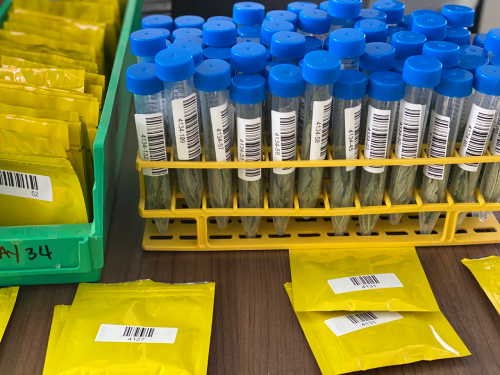Faculty Investigator Alex Harkess’ laboratory at HudsonAlpha Institute for Biotechnology, and their collaborators New West Genetics, were recently awarded a three-year, $650,000 United States Department of Agriculture National Institute of Food and Agriculture (USDA-NIFA) grant that aims to unlock the full potential of industrial hemp, a versatile plant used for centuries as a source of industrial fiber, seed oil, food, and medicine.
In our changing climate, there is a growing need for more adapted and sustainable crops. Industrial hemp is a promising candidate for sustainable fiber, protein, and oil because it has a deep, massive root structure that sequesters more carbon than typical row crops, requires lower inputs, and has greater drought and pest resistance.
Hemp plants are also interesting from a biological standpoint because they have separate male and female sexes. Among the two, female hemp plants possess greater commercial value due to their higher biomass production and exclusive ability to yield seeds that are rich in beneficial lipids and proteins. As a result, hemp breeders strive to achieve a substantial proportion of female plants thriving in their cultivated areas. This emphasis on maximizing female hemp plants aligns with the broader objective of harnessing the crop’s sustainable qualities to thrive in our changing climate.
HudsonAlpha Faculty Investigator Alex Harkess, PhD, and his lab are experts at studying the genetic basis of sex in plants. Through this USDA-NIFA grant, Harkess and his lab will build several high-quality hemp genomes and use them to identify and analyze the hemp sex chromosome pairs. Using a pipeline developed in the lab, the team will identify the master sex determination genes in hemp, which can be modified to control sex and increase the proportion of female plants, leading to a higher yield of fiber, oil, and protein. Breeding more female hemp plants will increase the yield and quality of hemp fiber, grain, and oil crops, making it a sustainable and valuable crop for farmers and consumers alike.
 “Separate male and female sexes have evolved hundreds if not thousands of times in plants, and finding the genes that control sex determination is so challenging because most plants do it very differently from each other,” said Harkess. “These genes are found on sex chromosomes, the most challenging chromosomes to sequence and assemble in plants. However, with HudsonAlpha’s historical expertise in plant genome sequencing, we are now able to reveal the full complexity of sex chromosomes in species like hemp and finally narrow in on the genes that control this agriculturally and economically valuable trait.”
“Separate male and female sexes have evolved hundreds if not thousands of times in plants, and finding the genes that control sex determination is so challenging because most plants do it very differently from each other,” said Harkess. “These genes are found on sex chromosomes, the most challenging chromosomes to sequence and assemble in plants. However, with HudsonAlpha’s historical expertise in plant genome sequencing, we are now able to reveal the full complexity of sex chromosomes in species like hemp and finally narrow in on the genes that control this agriculturally and economically valuable trait.”
HudsonAlpha will work closely with New West Genetics, a global leader in creating premium, stable hemp seed genetics that are trait enhanced for sustainability, food, feed, and fiber applications. They have experience combining traditional breeding, modern genomics, and agronomic expertise to create non-GMO, proprietary hemp seed bred for multiple markets. Further, they are actively developing new methods to modify the ratios of male and female plants in fields. NWG AMPLIFY™, the first commercial, scalable hemp hybrid, contains a genetic trait that creates hemp populations that are up to 100 percent female rather than the typical 50 percent. This shift, together with hybrid vigor, results in double the amount of grain and flower yield and much greater uniformity overall. Rich Fletcher, New West Genetics Chief Technology Officer, states: “This trait is due to a relatively simple genetic base that can be transferred to new varieties using a genetic marker. We are still investigating the cellular and molecular mechanisms of the trait with an end goal of full control over gender ratios.”
“Gaining greater understanding of the genomic basis for gender will be a powerful tool for improving the germplasm,” said John McKay, New West Genetics Chief Science Officer and professor of plant genetics at Colorado State University. “We also are curious to see if these discoveries could be instructive for male/female breeding targets in other species, both plant and animal. Working with HudsonAlpha on this grant will be exciting and result in quality research with solid commercial applications.”
To learn more about this project, read “Using Genomics to Unlock the Full Potential of Industrial Hemp.”
